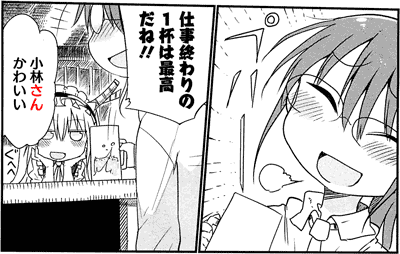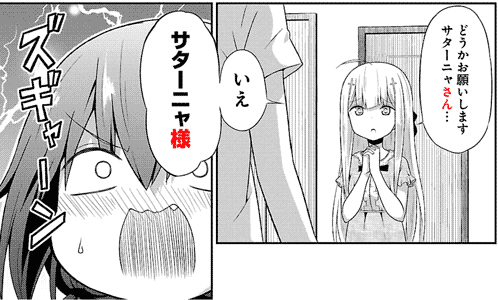In Japanese, ~san ~さん after someone's name is a honorific suffix, not to be confused with the homonymous number "three," san 三.
The san さん honorific is the most neutral and common of all honorific suffixes. In modern Japan, it's normal to call someone by adding san さん after their names. For example: Tarou-san 太郎さん. In English, this is often translated as "Mr." or "Ms.," like Mr. Tarou.
Usage
The san さん honorific is gender neutral, can be used toward men or women, people younger or older, people you know or that you don't, strangers, friends, family, colleagues, everybody, basically.
- Context: Kobayashi 小林 goes to a nomikai 飲み会 with Tohru トール.
- puhaa
プハー
*beer sigh*
- A satisfied sigh complete with smoke coming out of her mouth and radiated lines emanating from her.
- shigoto-owari no ippai wa saikou da ne!!
仕事終わりの1杯は最高だね!!
The one glass [after]-work is the best, [isn't it]!!- owari - noun form of owaru 終わる, "to end."
- shigoto-owari - end of work, i.e. after one's work ends.
- Kobayashi-san φ kawaii
小林さんかわいい
Kobayashi-san is cute. (literally.)
Mr. Kobayashi is cute. (awful translation.)
[You], Kobayashi-san, are cute. (appositive translation.)
Kobayashi-san, [you] are cute. (sentence-initial vocative translation.)
[You] are cute, Kobayashi-san. (sentence-final vocative translation.)
There are reasons to not use the san さん honorific. For example, some people find it weird to use san さん toward little children, and may use ~kun ~くん or ~chan ~ちゃん instead. Parents may use no honorific at all toward their own children.
Toward customers, in the business world, the more respectful ~sama ~様 is generally used instead.
- Context: Raphiel plays Satania like a fiddle.
- douka onegai shimasu
Sataanya-san...
どうかお願いしますサターニャさん・・・
Please [do it for me], Satania-san. - ie
Sataanya-sama
いえ サターニャ様
No. Satania-sama. - Here, Raphiel makes Satania feel important by using the ~sama ~様 suffix, which has added reverence. Raphiel only used the suffix here to compel Satania into doing something for her, but nevertheless managed to fawn her over with this display of blatant flattery.
Since you're normally used to use san さん toward other people, not using san さん, and calling them by their bare name, is considered informal, which means either being friendly, or overly intimate and rude, impolite.
See also: yobisute 呼び捨て.
Internet Usernames
Around the Japanese internet, it's normal for usernames to be suffixed with san さん automatically.
For example, if you create an account with the username xXNoobSlayer69Xx, your posts may have end up like this:
- xXNoobSlayer69Xxさん
git gud lol
San Juu
There's a certain pun involving the san さん honorific when it's used to say somebody's age. That's because san さん also means "three," so you can end up with a situation like this:
- maria-san juu nana sai
マリアさん17歳
Maria-san, 17 years old.- juu 十
Ten. 10. - nana 七
Seven. 7. - 10 + 7 = 17.
- juu 十
- maria san juu nana sai
マリアさんじゅうなな歳
Maria, 37 years old.- san-juu 三十
Three tens. Thirty. 30. - 3 × 10 + 7 = 37.
- san-juu 三十
Maria, in this case, is from Hayate no Gotoku! ハヤテのごとく!


No comments: